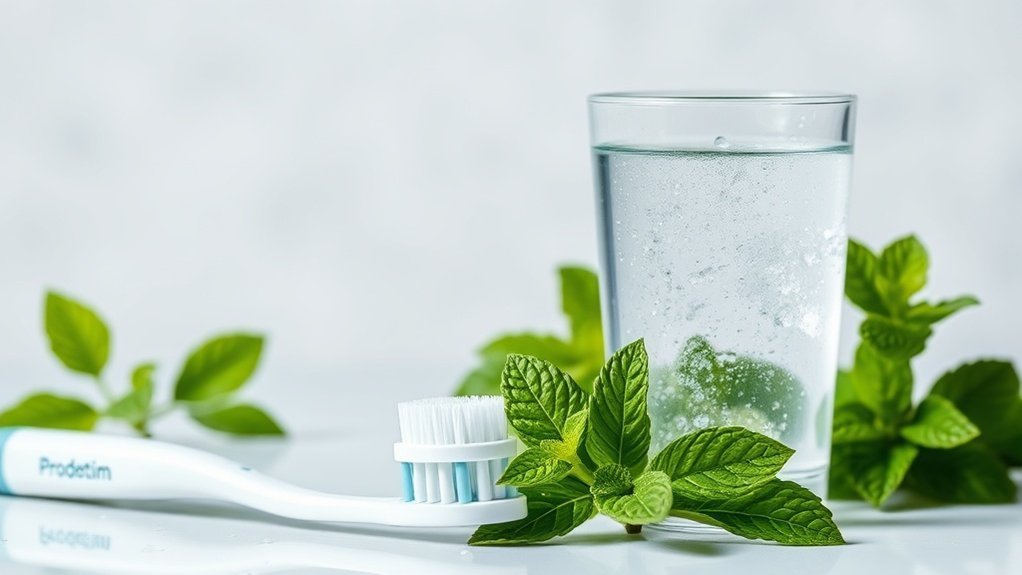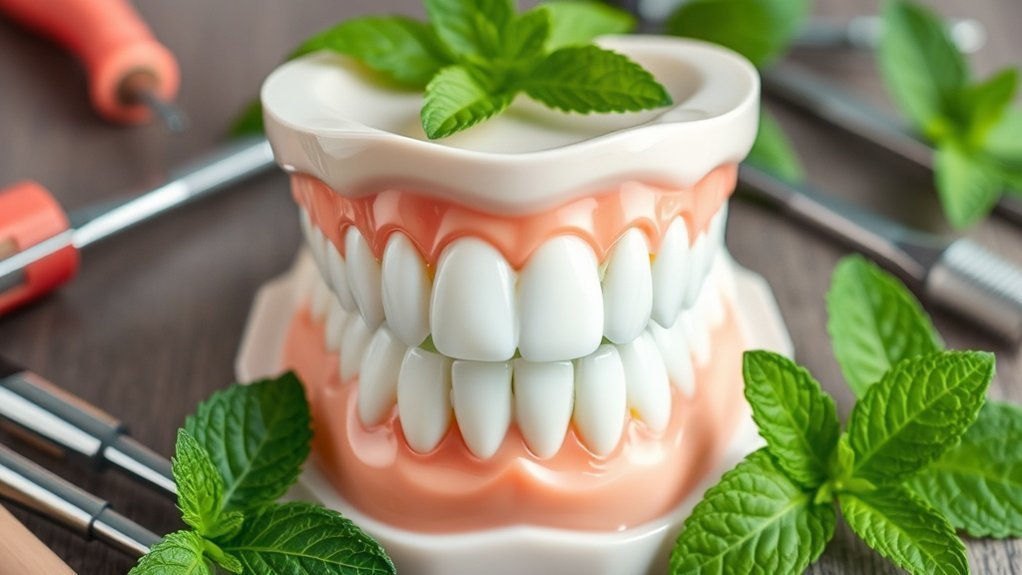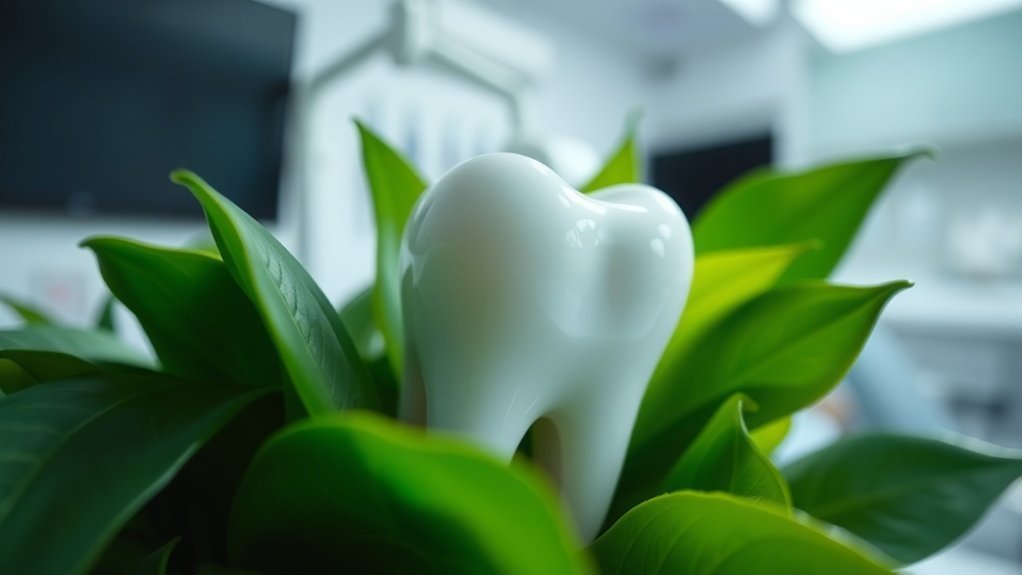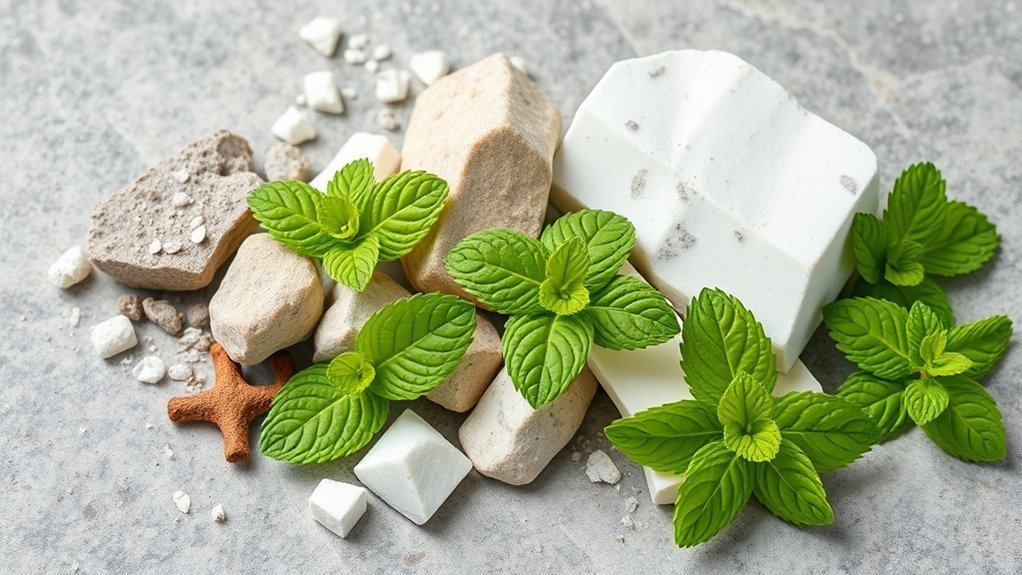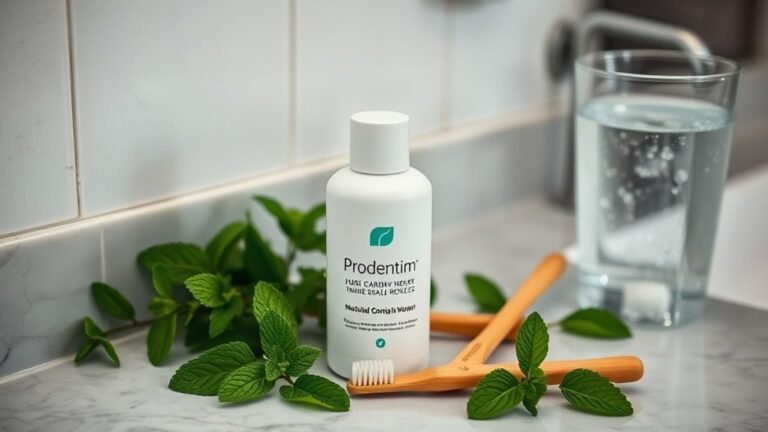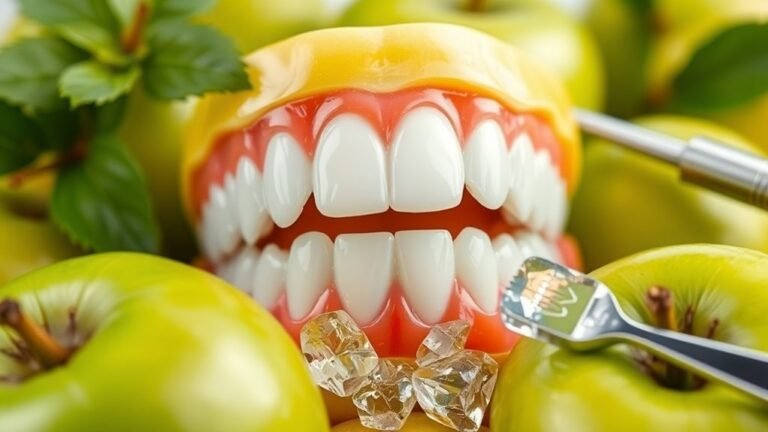What Natural Ingredients in Prodentim Help Remove Plaque Safely?
Natural ingredients in Prodentim, like probiotics, peppermint oil, calcium carbonate, xylitol, clove oil, and licorice root, work effectively to remove plaque safely. Probiotics balance your oral microbiome, while peppermint oil freshens breath. Calcium carbonate acts as a mild abrasive, and xylitol reduces cavity-causing bacteria. Clove oil fights plaque, and licorice root helps combat cavities and inflammation. Together, these ingredients promote overall oral health. There’s more to discover about how they enhance your dental care routine.
Key Takeaways
- Calcium carbonate acts as a mild abrasive, effectively scrubbing away plaque and preventing tartar buildup.
- Xylitol reduces cavity-causing bacteria while promoting saliva flow, aiding in plaque removal.
- Clove oil serves as a natural antiseptic, combating plaque buildup and freshening breath.
- Licorice root fights harmful bacteria responsible for cavities and helps prevent plaque formation.
- Probiotics maintain a balanced oral microbiome, preventing the growth of harmful bacteria linked to plaque.
The Role of Probiotics in Oral Health
When it comes to maintaining ideal oral health, probiotics play an essential role that often goes overlooked. These beneficial bacteria contribute considerably to your oral microbiome, the complex ecosystem in your mouth. A balanced oral microbiome helps prevent the growth of harmful bacteria that can lead to cavities and gum disease. By incorporating probiotics into your routine, you can enhance your oral health and support the natural defenses of your mouth. They can improve the balance of good and bad bacteria, promoting a healthier environment. Furthermore, regular consumption of probiotic-rich foods or supplements may reduce inflammation and improve overall gum health. So, taking probiotics isn’t just beneficial for your gut; it’s a smart choice for your oral health too.
Benefits of Peppermint Oil for Fresh Breath
Peppermint oil is renowned for its antimicrobial properties, which help combat the bacteria that cause bad breath. By incorporating this natural ingredient, you can experience fresher breath and improved oral hygiene. Understanding how peppermint oil works can enhance your daily routine and boost your confidence.
Antimicrobial Properties Explained
Although many people seek fresher breath through various means, few realize the potent antimicrobial properties of peppermint oil. This natural ingredient effectively combats oral bacteria, which are responsible for bad breath and plaque buildup. By using peppermint oil in your oral care routine, you can enhance plaque control and promote better overall dental health. Its antimicrobial properties work to inhibit the growth of harmful bacteria, reducing the risk of dental issues. Additionally, peppermint oil’s invigorating aroma masks unpleasant odors, providing a dual benefit. Incorporating this powerful oil into your daily regimen not only helps maintain fresh breath but also supports a healthier mouth by targeting the root causes of plaque and bacteria.
Breath Freshening Benefits
A burst of peppermint oil can greatly enhance your breath freshness. This natural ingredient offers significant breath freshening benefits, making it a popular choice in oral hygiene products. Not only does it mask bad odors, but it also helps in plaque removal, promoting a cleaner mouth.
Here are three key benefits of peppermint oil for fresh breath:
- Antimicrobial Properties: It combats bacteria that cause bad breath, improving overall oral hygiene.
- Cooling Sensation: The invigorating taste leaves your mouth feeling revitalized and clean.
- Enhanced Saliva Production: Increased saliva helps wash away food particles and plaque, further contributing to fresher breath.
Incorporating peppermint oil into your routine can elevate your oral health experience.
How Calcium Carbonate Contributes to Plaque Removal
Calcium carbonate plays an essential role in effectively removing plaque from your teeth. This natural ingredient acts as a mild abrasive, helping to scrub away plaque and prevent tartar buildup. By incorporating calcium carbonate into your oral hygiene routine, you’ll enhance your ability to maintain a clean and healthy mouth. Its effectiveness lies in its ability to neutralize acids produced by bacteria, which can lead to plaque accumulation. Regular use of products containing calcium carbonate can greatly improve your dental health, ensuring that you keep plaque and tartar at bay. Remember, a consistent oral hygiene routine that includes calcium carbonate can lead to a brighter smile and stronger teeth.
The Impact of Xylitol on Dental Hygiene
Xylitol plays an essential role in enhancing your dental hygiene due to its antimicrobial properties. It effectively reduces plaque formation by inhibiting the growth of decay-causing bacteria. Incorporating xylitol into your oral care routine can lead to healthier teeth and gums.
Xylitol’s Antimicrobial Properties
In recent years, xylitol has gained attention for its impressive antimicrobial properties, particularly in promoting dental hygiene. As a natural ingredient, xylitol plays an essential role in oral wellness by aiding in bacterial reduction. Here’s how it contributes:
- Reduces cavity-causing bacteria: Xylitol disrupts the growth of harmful bacteria, helping to maintain a healthier mouth.
- Promotes saliva production: Increased saliva flow helps neutralize acids and wash away food particles, further supporting oral health.
- Enhances remineralization: Xylitol helps in mineral absorption, which strengthens tooth enamel and prevents decay.
Incorporating xylitol into your routine can notably enhance your dental care regimen, ensuring a cleaner mouth and better overall oral wellness.
Plaque Reduction Mechanism
When you incorporate xylitol into your dental routine, you’ll notice its significant impact on plaque reduction. Xylitol works as a powerful plaque reduction mechanism by disrupting the growth of harmful bacteria, promoting a healthier microbial balance in your mouth. This natural ingredient not only prevents plaque formation but also supports overall oral care.
Here’s a quick comparison of xylitol’s benefits:
| Benefit | Description |
|---|---|
| Reduces plaque | Disrupts harmful bacterial growth |
| Enhances saliva flow | Promotes natural remineralization of teeth |
| Balances pH levels | Creates an unfavorable environment for decay |
| Freshens breath | Neutralizes acids produced by bacteria |
| Supports gum health | Reduces inflammation and irritation |
Incorporating xylitol can lead to a healthier smile!
Clove Oil: A Natural Antiseptic for Teeth
Clove oil, derived from the buds of the clove tree, serves as a powerful natural antiseptic for dental health. It effectively combats dental biofilm, which contributes to plaque buildup and can negatively impact gum health. By incorporating clove oil into your oral care routine, you can enjoy several benefits:
- Antimicrobial Properties: Clove oil helps eliminate harmful bacteria that cause plaque and gum disease.
- Pain Relief: Its soothing properties can alleviate toothache and discomfort associated with gum inflammation.
- Fresh Breath: Clove oil naturally freshens breath by neutralizing odors and reducing bacteria in the mouth.
Utilizing clove oil not only promotes a healthier smile but also supports your overall dental hygiene effectively.
The Power of Licorice Root in Fighting Cavities
Have you ever considered the benefits of licorice root for your dental health? This powerful natural ingredient plays an essential role in cavities prevention. It contains glycyrrhizin, which can help combat oral inflammation and bacteria that contribute to tooth decay. By incorporating licorice root into your oral care routine, you can support a healthier mouth.
| Benefits | How It Works | Key Components |
|---|---|---|
| Cavities Prevention | Fights harmful bacteria | Glycyrrhizin |
| Reduces Inflammation | Soothes gum irritation | Flavonoids |
| Antibacterial | Prevents plaque formation | Antioxidants |
Using licorice root not only enhances your dental hygiene but also contributes to overall oral health. Consider it a natural ally in your fight against cavities.
Frequently Asked Questions
Can Prodentim Be Used by Children Safely?
Yes, Prodentim can be used by children safely, but it’s important to consult your pediatric dentist first. They’ll provide guidance on proper usage and guarantee it’s suitable for your child’s specific dental needs.
How Often Should Prodentim Be Applied for Best Results?
You should apply Prodentim twice daily for ideal results. Consistent use helps maintain your oral health and effectively reduces plaque buildup. Remember to follow the manufacturer’s instructions for the best outcomes in your dental care routine.
Are There Any Side Effects of Using Prodentim?
While most users experience no side effects, some might notice mild irritation or sensitivity. It’s wise to monitor your response closely and consult a dentist if any unusual symptoms arise during your Prodentim use.
Is Prodentim Suitable for Those With Sensitive Teeth?
Yes, Prodentim’s formulation is suitable for those with sensitive teeth. It uses gentle, natural ingredients that help maintain oral health without causing discomfort, ensuring you can enjoy its benefits without aggravating your sensitivity.
How Long Does It Take to See Results With Prodentim?
When it comes to seeing results with Prodentim, you’ll usually notice improvements within a few weeks. However, individual experiences may vary, so stick with it to achieve the best outcomes for your dental health.
Conclusion
Incorporating natural ingredients like probiotics, peppermint oil, calcium carbonate, xylitol, clove oil, and licorice root into your oral care routine can greatly enhance your dental health. These components work hand-in-hand to tackle plaque, freshen breath, and fight cavities, making your smile shine bright. Remember, taking care of your teeth is like keeping a well-oiled machine; it requires consistent effort and the right tools. Embrace these natural solutions, and you’ll be on your way to a healthier mouth!

